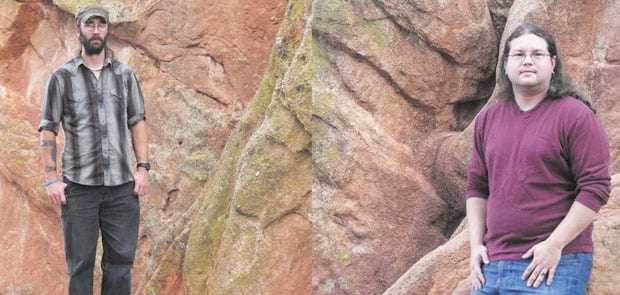Northeast Texas couple hit a wall of bigotry when they tried to plan a hometown ceremony

While finding a wedding venue may not be a problem in Dallas or Fort Worth, Waylon Jordan, right, and Bill Mead couldn’t find a location that would accommodate them near their East Texas town.
David Taffet | Senior Staff Writer
Waylon Jordan and Billy Mead, who live in a small town in Northeast Texas, have been together for 11 years. When the Supreme Court decision legalizing same-sex marriage was handed down, they decided to do what lots of couples across the country did — get married.
But rather than running directly to the county clerk, Mead wanted to take some time and plan an event. He wanted his family to come down from Colorado for the wedding, and Jordan always wanted to get married outdoors. He envisioned water as part of the setting.
So they started to gather names of venues in the area. Jordan said that a number of property owners there have opened their farms and ranches to host weddings and other events. Some have converted barns for dances and receptions. Others offer pretty settings with trees and gazebos.
So last summer, Jordan and Mead sent out their first round of emails to the local venues. Because they didn’t want any surprises down the line, they made it clear up front that they are a same-sex couple.
They didn’t get a single response.
So they sent a second round emails. This time, the responses came.
“Waylon, I’m sure you understand that we must follow our own conscience and beliefs on this issue and therefore we cannot offer our venue for your wedding,” one venue owner wrote.
“At this time, I’m not even sure that the decision by the Supreme Court is even legal and I certainly cannot see our venue being party to same-sex marriages,” wrote another. “It goes against everything we believe. I’m sure you can find another place, but it won’t be with us.”
On the one hand, Jordan and Mead appreciated the honesty. They didn’t want people sharing their wedding day who wouldn’t share their joy.
On the other hand, they were angered by what was clearly bigotry and ignorance, and the one response questioning the legality of the
Supreme Court ruling, Jordan said, was just completely wrong. It was wrong about them finding another place, too: They couldn’t.
But a third response was possibly the most frustrating: “One went out of their way to let us know that they really didn’t support us, but they supposed money was money,” Jordan said.
Considering the amount of money they’d be spending on their wedding, the couple didn’t think that response was any better than the one who didn’t think a Supreme Court ruling was legal.
Both Jordan and Mead were clear. They didn’t want to give publicity to any venue not interested in their business. That’s why they didn’t identify the venues to a reporter. They didn’t want to create another Memories Pizza, referring to the restaurant in a small Indiana town that made national headlines when they announced they weren’t going to cater gay weddings, closed their doors and raised almost $1 million in a week from people concerned about the way the restaurant had been discriminated against.
Jordan and Mead also understood they had little recourse in fighting the discrimination they faced. While Dallas, Fort Worth and Plano have ordinances protecting against discrimination based on sexual orientation, Texas does not. Neither does the U.S. federal government.
JPs in the county where Jordan and Mead live have all stopped performing weddings rather than perform same-sex weddings.
Because they’re in a college town, the couple has other gay friends who live nearby. Their friends didn’t have any better luck planning a local wedding.
“Friends went to Burleson, a two-and-a-half hour drive, just to have a wedding,” Jordan said. “Now we know why.”
Jordan and Mead said the ordeal of finding a venue has drawn them even closer together than they were before. They met online thanks to their mutual love of horror films and novels, and after they had been chatting online for six months, Mead moved to Texas from Colorado to be with Jordan.
Because of their interest in the horror genre, Jordan said he envisioned their wedding on Halloween with a Tim Burton theme. “We wanted to make it a really memorable day,” he said. “That’s gone by the wayside.”
Both men work at a Walmart. They said they find it funny when they hear random comments like, “Those damn faggots are ruining everything.”
“If they only knew who they were talking to!” Mead declared. He works in the sporting good department where, among other things, he sells guns and hunting knives. And he certainly doesn’t fit the typical stereotypes, his partner said.
“Bill’s as likely to be working on a car,” Jordan said. “He’ll talk about rebuilding an engine. It throws people.”
But it’s Mead’s family that has been most accepting, even offering to help pay for the wedding. Jordan’s family said they wouldn’t participate in their wedding and for years ignored Mead when he was there. So now the couple is looking at a September wedding.
“We’re going to Colorado to do a wedding in [Mead’s family’s] great big, beautiful home,” Jordan said. He admitted that it hurts that most of their friends wouldn’t be able to come. But Jordan said having the wedding in Colorado wasn’t a compromise.
“They have some land with a coy pond,” he said. “So I get my water.”
This article appeared in the Dallas Voice print edition March 18, 2016.

